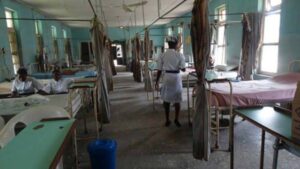EDITORIAL: HAZARD ALLOWANCE – HOW MUCH HAZARD IS ALLOWED?
About 3 years ago, I was in the Accident and Emergency department running around for procedures and signatures. In the process of setting an intravenous line for a patient, I inadvertently pricked myself. I still remember all the thoughts I had as I waited for the patient’s retroviral screening result that night and my result about a week later. I remember the medical officer mentioning that I did not qualify for hazard allowance as a student. I remember, most strikingly, another medical officer mentioning that it won’t matter anyway.
About two weeks ago, a doctor in UCH was put in the same dilemma, except they were not so lucky as the patient had Hepatitis B. I can only imagine their fear and apprehension immediately after the incident and eventual relief when they were able to crowd source enough money to get appropriate treatment.
Last night, a young House Officer at Odan Hospital, Lagos lost her life when the elevator she was in fell down ten floors. She reportedly survived the fall, only to bleed out since the hospital’s blood bank could not provide blood. It has also been reported that the faulty elevator was not a new problem and the hospital management had opted to simply patch it everytime it broke down, a decision with calamitous consequences. Apparently, there have been similar stories of elevator falls in UCH as well, albeit non-fatal.
Stories of doctors in Nigeria being harmed by the system they serve are as numerous as they are gruesome. Needle stick injuries, disgruntled patients and relatives, poor remuneration and now, falling elevators. One can only wonder what painful events Nigerian doctors would have to suffer as a community before their welfare is taken seriously. Last month, the Lagos state government announced that it would increase doctors’ hazard allowance from 5,000 Naira to 25,000 Naira; a laughable sum to a slightly less laughable sum. And many wonder why japa syndrome is a thing.

The truth is, the appalling work environment Nigerian doctors have to operate in is not peculiar to the profession. Virtually every other profession in the country has its own horror stories. Nothing would change until the people in charge are held responsible when horrible things happen. A country’s citizens are entitled to protection from the government of their country and until Nigeria’s leaders and people accept this, I fear that terrible things will continue to happen.
